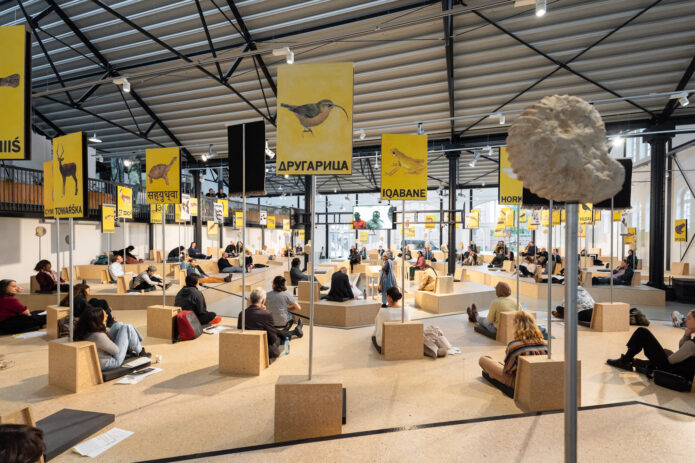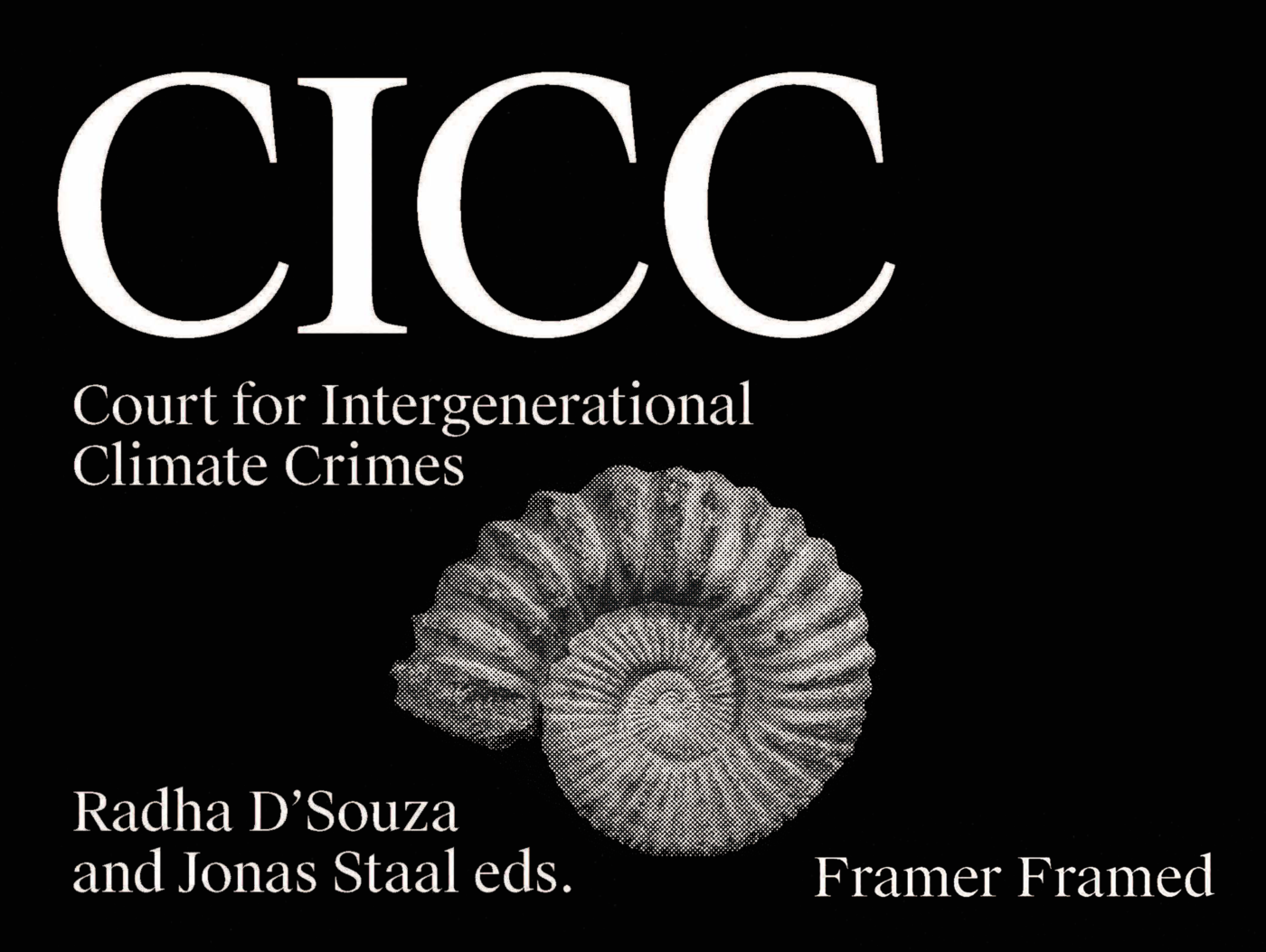 CICC Book Cover
CICC Book Cover Bookshop Selection: Court for Intergenerational Climate Crimes
Framer Framed is publishing a book about the Court for Intergenerational Climate Crimes. This publication, bringing together work by academic Radha D’Souza and Dutch visual artist Jonas Staal from the 2021 exhibition at Framer Framed and beyond, confronts the colonial foundations of unjust global systems driving the climate crisis through public hearings, giving voice to marginalised communities against states and corporations.
You can order the CICC book through the Framer Framed webshop!
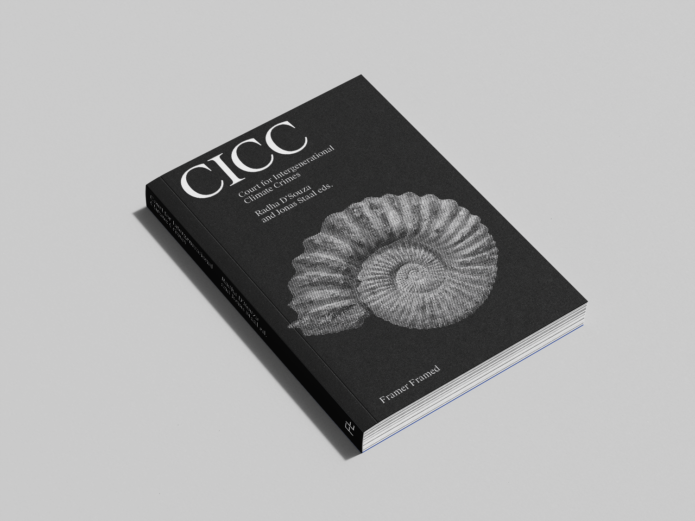
Staal and D’Souza’s stunningly ambitious CICC defines a horizon beyond systems of property and world-ending climate crimes.
– T. J. Demos, author of Radical Futurisms: Ecologies of Collapse, Chronopolitics, and Justice-to-Come
D’Souza and Staal’s radical approach to the consideration of responsibilities and mutual respect, arrives to this modern, alienating and demeaning world as a bucket full of tiny papers with memories written on them.
– Ramón Vera-Herrera, GRAIN (Latin America) and edito Biodiversidad, Sustento y Culturas
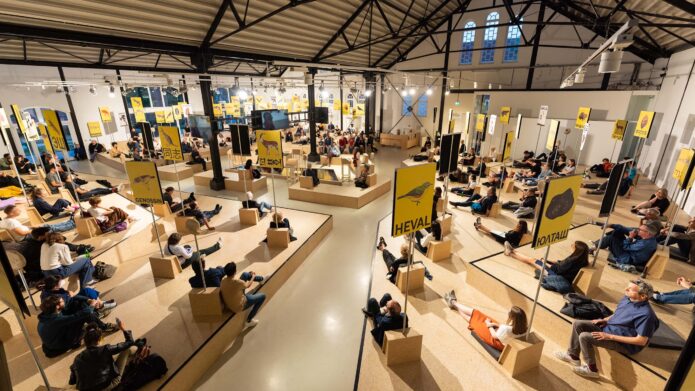
Photo: Ruben Hamelink
The Court for Intergenerational Climate Crimes (CICC) is a collaboration between Framer Framed, Indian academic, writer, lawyer and activist Radha D’Souza and Prix de Rome winning artist, Jonas Staal. The aim of the CICC is to prosecute climate crimes committed by states and corporations, not only in the past and present, but also in the future. Central to this book is the first iteration of the project, commissioned and staged by Framer Framed in 2021, during which public hearings were held against the Dutch State and transnational corporations registered in the Netherlands: Unilever, ING and Airbus.
The book is divided into three main parts. The Cases section focuses on four significant cases brought against the State of the Netherlands, Unilever, ING Group, and Airbus Industries for intergenerational climate crimes. These cases present the charges and evidence against each defendant, with prosecutors from alternative research and journalism networks laying out the arguments that challenge mainstream subservience to racial-ecocidal-neocolonial capitalism. Testimonies from witnesses shed light on the fact that climate crimes are predominantly confined to a dislocated “somewhere else” due to neocolonialism’s division of extraction sites from planning locations.
The Judges section introduces the CICC’s panel of judges who oversee the public hearings, similar to traditional courts. What distinguishes these judges is the legitimacy they derive from their lifelong dedication to seeking justice for real people and nature across different continents. The CICC also establishes a public jury comprising individuals who willingly attend the public hearings. These individuals evaluate witness statements based on the Intergenerational Climate Crimes Act of 2021. The verdicts in this section provide concise summaries of the judges’ decisions and outline the consequences based on the evidence presented during the cases.
Lastly, the Reflections section offers critical essays by theorists Tobias Dias, Ashley Maum, and Joram Kraaijeveld. These essays provide an in-depth analysis of the public hearings at the CICC. The essays explore the impacts and contradictions observed during the court proceedings. Furthermore, Stephanie Bailey conducts interviews with D’Souza and Staal, where they discuss the accomplishments of the CICC thus far and outline their aims for the future.
The publication can be ordered through the webshop of Framer Framed.
Editors
Radha D’Souza
Jonas Staal
Ashely Maum
Irene de Craen
Ebissé Wakjira
Contributors
Stephanie Bailey
Tobias Dias
Radha D’Souza
Nicholas Hildyard
Joram Kraaijeveld
Rasigan Maharajh
Ashley Maum
Jonas Staal
Sharon H. Venne
Graphic design
Remco van Bladel
Publisher
Framer Framed
Info
ISBN: 9789083079349
424 blz.
Text and colour illustrations
16 x 23 cm | paperback
English, 2024
€29,95
Production
The CICC publication is entirely in-house produced with nonproprietary software that is developed bij Framer Framed and Archival Consciousness.
This publication has been realised with thanks to multi-year support from the Dutch Ministry of Education, Culture and Science and the Amsterdam Fonds voor de Kunst. In additional, the publication was realised thanks to the generous support of the Stimuleringsfonds voor Creatieve Industrie within the project The New Social: Hybrid Strategies for Cultural Spaces.
- Framer Framed - Webshop
Links
CICC / Bookshop Selection / Ecology /
Exhibitions
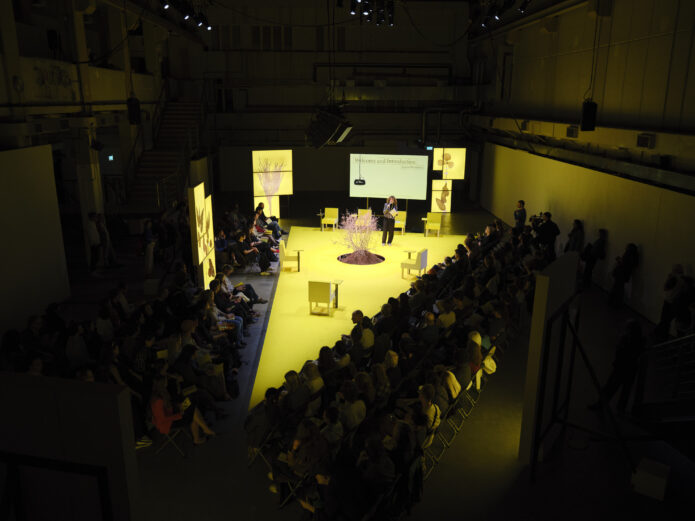
Exhibition: CICC London – The British East India Company on Trial
An exhibition of the CICC in London focused on the colonial and industrial crimes of the British Crown and the East India Company.

Exhibition: CICC Gwangju Biennale - Extinction Wars
An exhibition of the CICC at the Netherlands Pavilion of the Gwangju Biennale, South Korea, commissioned and produced by Framer Framed.
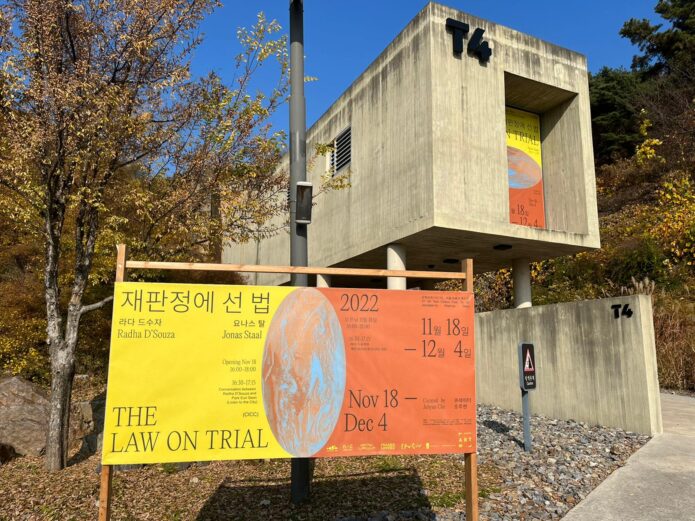
Exhibition: CICC Seoul - The Law on Trial
A new iteration of the project Court for Intergenerational Climate Crimes (CICC) at the Oil Tank Culture Park in Seoul, South Korea.
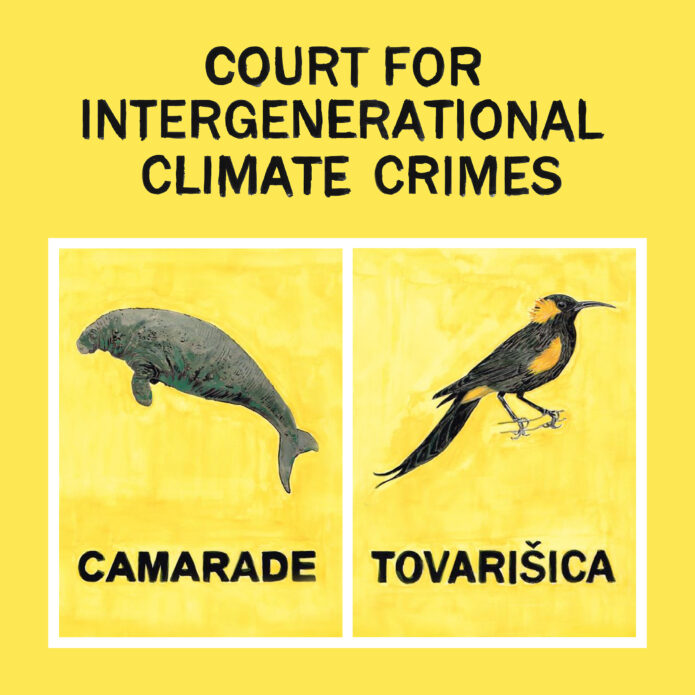
Exhibition: Court for Intergenerational Climate Crimes
A project by Radha D'Souza and Jonas Staal
Agenda
Book launch: CICC — War Crimes are Climate Crimes
Call to action and book launch for the new publication Court for Intergenerational Climate Crimes
The New Social: Hybrid Strategies for Cultural Spaces - at Dutch Design Week 2023
Part of the exhibition Innovatie Labs #1: The Living Archive in Klokgebouw, Eindhoven
Network

Remco van Bladel
Designer
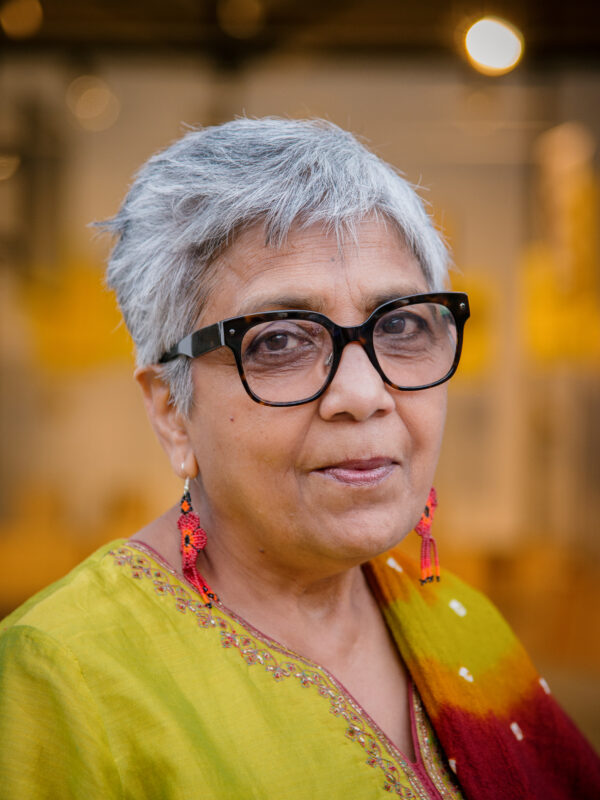
Radha D'Souza
Writer, academic, lawyer and activist
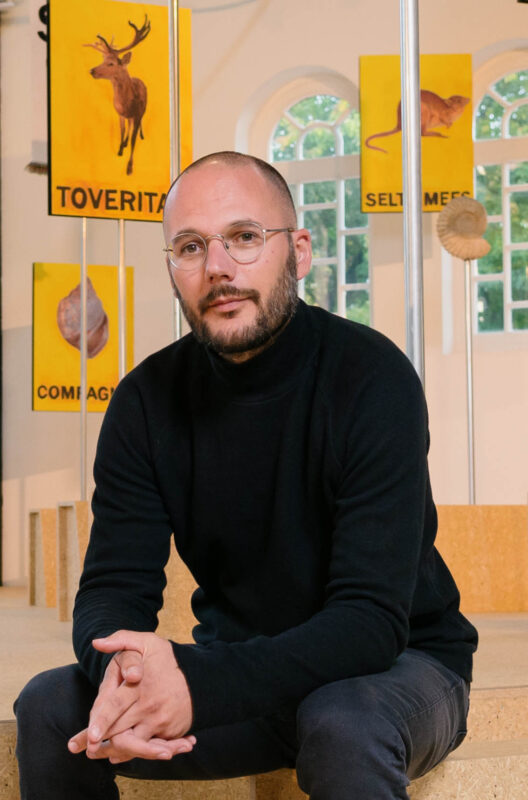
Jonas Staal
Artist
Magazine
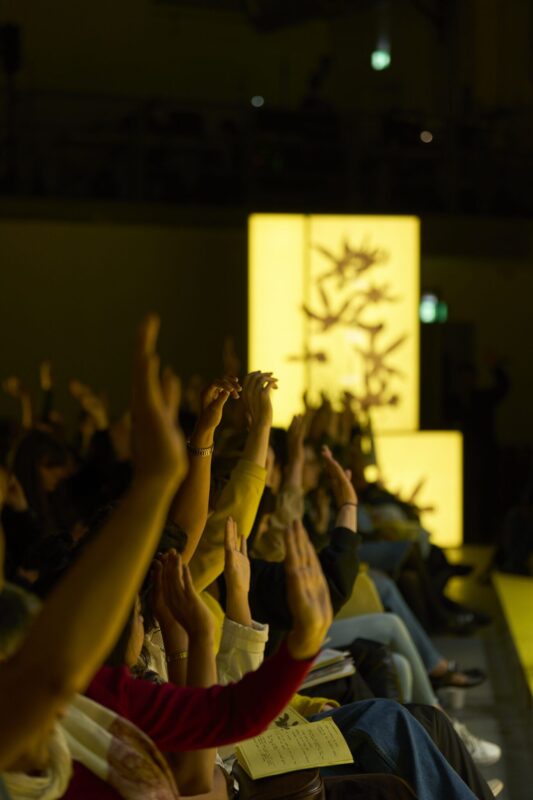
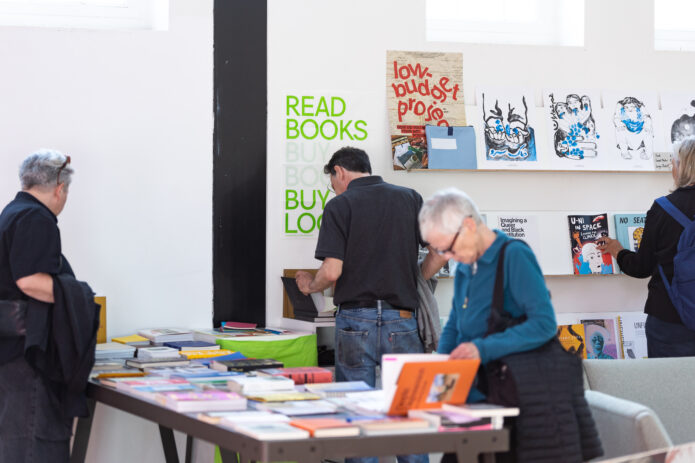
From Archiving to Publishing: Framer Framed's 'New Social'

The New Social: Hybrid Strategies for Cultural Spaces - at Dutch Design Week 2023

Court for Intergenerational Climate Crimes: The Law on Trial
